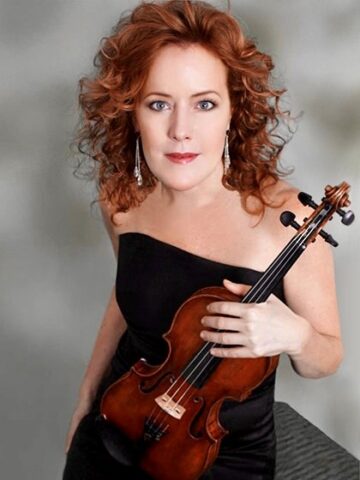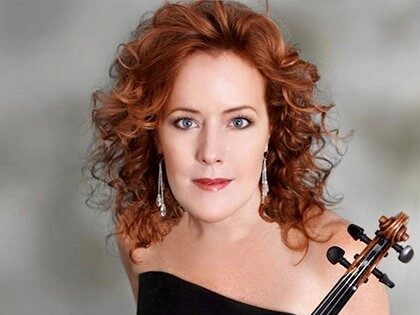
CMPI Violin Faculty Member Desirée Ruhstrat
Desirée Ruhstrat’s journey as a violinist and educator began at age three-and-a-half, when she started her studies at the Wisconsin Conservatory of Music. She continued her pedagogy with Betty Haag in Chicago – commuting with her mother (herself a lover of classical music and the violin) to and from the City – until age eight. Her journey has since brought her to some of the world’s great concert stages as a soloist, including performances with the Milwaukee Symphony, Berlin Radio Symphony, and many others.
Ruhstrat’s accomplished performance career aside, she has gained equal acclaim as a teacher. She began teaching while in high school and now is on the faculty at the Northwestern University’s Bienen School of Music. One aspect of her educational philosophy is an awareness that her students likely will have different journeys – a concept that has served her well as a faculty member with the Chicago Musical Pathways Initiative.
“The most important thing for me is that a student goes away with a love of music and the violin,” Ruhstrat explained during a recent interview. “Not everyone will be a concert violinist, some of my students may eventually choose different career paths, but for all, music has been such an important part of their childhood and they will realize the older they get, what a privilege and gift it is to have music as a part of their lives forever.”
Because of this realization, Rushtrat treats every student as an individual and tailors a unique path for each, depending on where they would like their studies to take them. “Many of my students also become lifelong friends no matter what path they take.”
One of Ms. Ruhstrat’s fondest memories was performing John Adams’ Shaker Loops at the Ravinia Festival with two of her former students, Gina DiBello (now with the Chicago Symphony Orchestra) and Dayna Anderson (now with the National Symphony Orchestra.)
Regardless of career ambitions, Ruhstrat encourages students to think like a performer, including the times when they’re not in front of an audience. “Even when in the practice room, students should envision themselves on stage, and to practice for the concert hall. I think this approach produces a more performance-oriented sound. I also think sound is your signature as a performer, so I make it a priority. The left and right hands are our musical paint brushes and really can produce so many wonderful colors and varieties in our tone.”
An alumna of the Curtis Institute of Music, Ruhstrat discovered early on that she had an unexpected connection to CMPI. “I have always been a big fan of Stanford Thompson and his organization, Play on Philly,” she recalled. “I remember the first time I was contacted by [CMPI Project Director] Adrienne Thompson. I had no idea that she was Stanford’s mom, so when he connected the dots for me, I knew that this was going to be one of the best things that could happen to Chicago!”
Ruhstrat now teaches four CMPI violinists and has found numerous benefits to working with the program. “[CMPI] provides incredible financial and emotional support for both the student and the family. The program features great learning and performance opportunities in addition to various checks and balances, which are important factors for a successful musical education.”
Ruhstrat’s involvement with CMPI goes beyond private lessons. In November of last year, she presented a masterclass on the music of J.S. Bach. And, more recently, she created a “practice buddy” program, which pairs CMPI string fellows with students at Northwestern University. When asked to describe how she came up with the idea, Ruhstrat explained that she was thinking of ways to help some of the kids and their teachers.
“A student of mine at Northwestern, David Cao, started the Evanston Young Artists program, which I also am very involved with. The program makes music lessons accessible to area students to help further diversity in music institutions and performing ensembles. The idea came about because so often, as primary teachers, we do not have time in a lesson to cover other music – such as chamber or orchestral parts for school and auditions, or all the scales and etudes.” Regarding the name, Ruhstrat said that when it came time to make a choice, “the words ‘practice teacher’ were definitely not as fun as ‘practice buddy!’”
When asked whether she had any other words to share with our readers, Ruhstrat acknowledged that “it’s been a challenging year, to say the least, for all of us. I just want to commend all the students for hanging in there, practicing, and keeping their music going during these trying times! We have so much to look forward to, now, with things starting to open up again, and I cannot wait to see you all on stage performing live again!”
Watch Desirée perform Hans Krasa’s Tanec for String Trio with her chamber group, the Black Oak Ensemble, in honor of Holocaust Remembrance Day (April 8). This composition is part of the Black Oak Ensemble’s new album, Silenced Voices.
TOP: Violin soloist and educator Desirée Ruhstrat serves on the faculty at Chicago Musical Pathways Initiative and Northwestern University’s Bienen School of Music. |
